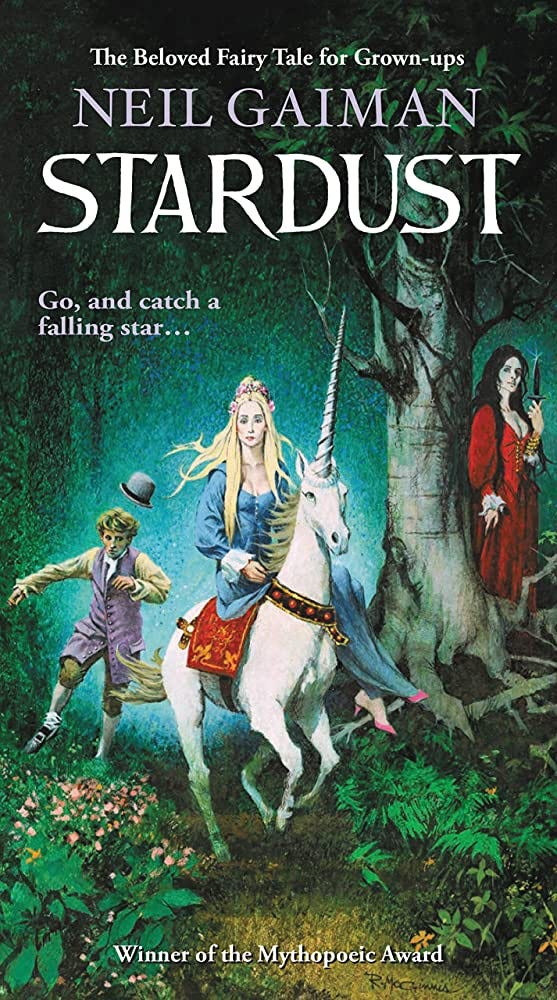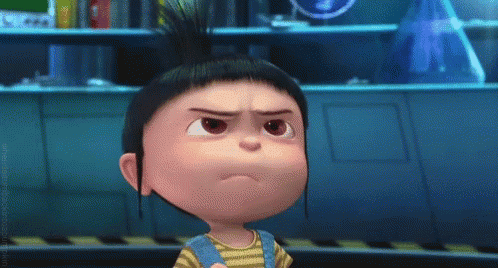The fantasy novel follows a young man’s odyssey across the land of Faerie in search of a fallen star, which he has promised to find and gift to his love, Victoria. On his journey, he encounters a smorgasbord of other characters who are also after the star for personal reasons — and are willing to kill for it.
Neil Gaiman is one of my favourite authors. Admittedly, I’ve only read Coraline and Ocean at the End of the Lane, but I know enough of his other works to feel confident about that statement. He is what I would call a tone-bender — especially after reading his 1999 novel Stardust, which I would describe as a wonderful tossed salad of genres and tones.
Don’t let the 80’s Renaissance fairytale-romance cover fool you (note: it’s gotten a few modern updates over the years but I like this one best) — Coraline and Ocean are pretty dark themselves (sewing buttons into your eyes and monster-rape can be hard concepts to swallow), but I’d say they are a whole notch down from Stardust.
It starts off cute and whimsical enough as Gaiman acquaints us with the fictional village of Wall, which borders the forbidden land of Faerie, and its inhabitants. But as the story progresses and more storylines and characters are woven in, the stakes grow higher, and everyone grows increasingly desperate and unhinged. I mean, like, really unhinged. Like, Colonel Hans Landa unhinged.
This one isn’t for the faint-hearted. In uncomplicated, plain-spoken prose, Gaiman paints with his dexterous literary fingers a blood-spattered fantasy-adventure cinematic that simultaneously invokes childhood nostalgia and visceral disgust — a Gaiman signature that can never quite be replicated by anything or anyone else I’ve read.
I’ve seen some reviews on Goodreads saying the central character, Tristran, is annoying and unlikeable. Having grown up almost exclusively on books with female protagonists, I enjoyed how different a teenage boy’s reaction to fantastical events can be. Gaiman’s male characters are flawed and oftentimes confounding, but that is exactly why I love reading them.
So much of our personality and thought processes are shaped by our childhood experiences. Vicariously reimmersing ourselves in the hubris and fallacies of growing up can not only help us reconnect with innocence and humility lost, but also reveal new perspectives we may not have been able to see otherwise.
If I had to nitpick a gripe, gun-to-my-head, it would be Tristran’s name. I’m a stickler for pronouncing names correctly, and the extra ‘r’ keeps throwing me off, lol. No biggie, though. The fact remains that Stardust left me hungering for more dark spins on traditional folklore, absolutely bat-shit insane characters, and plot twists that will give me enough whiplash to break my neck.
Neil Gaiman, if you happen to be reading this, I’m holding my breath until you put out another book of this genre!!
Oh, yes, it may be worth mentioning that a film adaptation of Stardust exists. While kept PG and not 100% accurate to the novel, it is, according to comments and reviews, much funnier and severely underrated.
Here’s the trailer to give you a taste of the plot and vibes of Stardust:
More on:
Neil Gaiman — An Amateur's Exegesis of THE OCEAN AT THE END OF THE LANE (and CORALINE)
The importance of a child’s perspective — The Brilliance of ALL THE LIGHT WE CANNOT SEE










Also Sandman <3